Life sciences
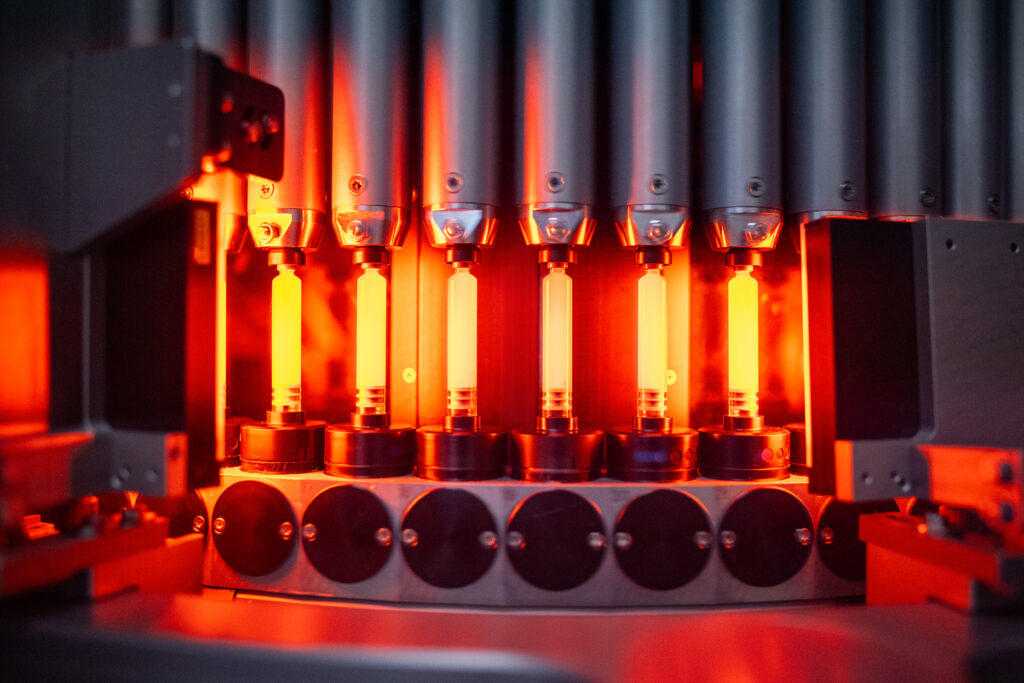
In the heart of a unique cross-border research and innovation ecosystem, Alsace stands out for its expertise in life sciences, particularly in health and medical technologies, which employ nearly 40% of the region’s scientists.
Alsace enjoys global recognition for its proficiency in molecular biology, fine chemistry, and digestive surgery.
This collaborative and interconnected ecosystem thrives on a complete chain of excellence at the local level, creating a virtuous circle that spans every stage of technological innovation: education, research, technology transfer, and industry. Explore the details of each link below.
Summary
A thriving business ecosystem
France BioValley health innovation cluster

As Europe’s only trinational health cluster, the BioValley biocluster in the Upper Rhine region offers unmatched opportunities for collaboration between companies and academic institutions. It focuses on four key areas: innovative medicines and therapies, medical technologies, diagnostics, and e-health.
The cluster’s goals are to foster the development of cutting-edge medical technologies, advance next-generation biological and biochemical drugs, drive the adoption of e-health solutions, and improve diagnostic tools.
The Nextmed campus
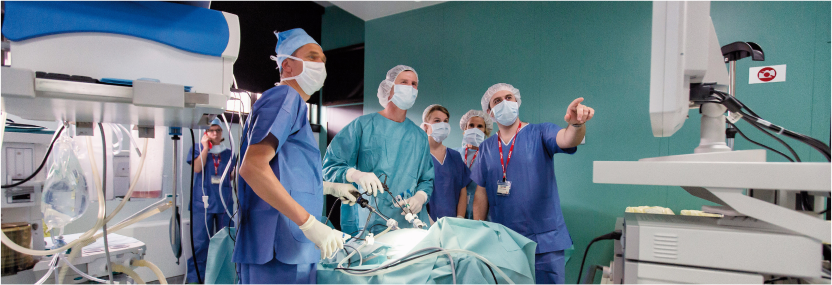
Nestled within the Strasbourg Civil Hospital, the Nextmed campus spans over 30 hectares, bringing together doctors, researchers, entrepreneurs, and patients to create the future of healthcare. With a focus on innovative patient care solutions, especially through digital technology and AI, Nextmed is at the crossroads of hospital-university functions, including patient care, education, fundamental research, and R&D.
Since 2023, its new building, eXplora, has provided 5,000 m² for businesses in the sector, marking the first phase of a planned 27,000 m² facility dedicated to housing innovative healthcare companies.
Nextmed offers an optimal working environment for researchers, industry professionals, entrepreneurs, and clinicians. It supports project leaders from concept through to market launch, covering all stages from incubation to acceleration.
This dynamic hub complements other key facilities such as the pH8 business incubator and the BioCluster des Haras, both dedicated to health and innovation.
The Strasbourg Innovation Park
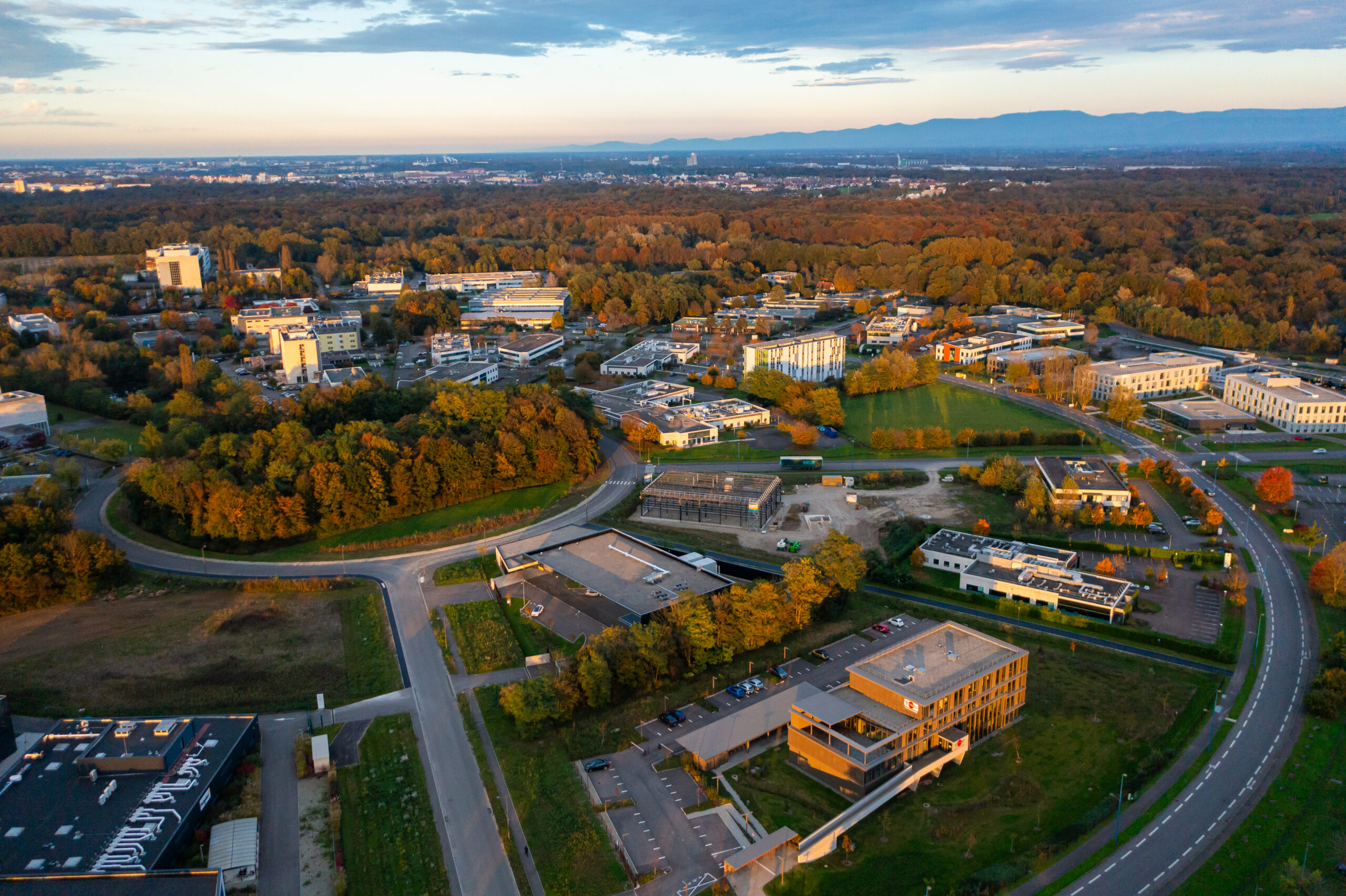
Established in 1983 as a crossroads for research and innovation, the Strasbourg Innovation Park fosters the growth of high-tech companies.
Spanning over 170 hectares, the park provides a hub of top-tier services and infrastructure, bringing together the University, businesses, and various services. Prominent organizations based there include the International Space University (ISU), Biosynex, Novalix, Transgene, Quidel Ortho, Domain Therapeutics, and Polyplus Transfection.
The park’s objectives include:
- Providing top-tier facilities and infrastructure for businesses
- Facilitating public-private partnerships to encourage research and technology transfer
- Supporting the creation, incubation, and housing of startups
- Offering personalized project support
- Providing targeted financial aid
- EASE Factory: A unique European educational site for hands-on learning of best manufacturing practices
- Offering Bioparc spaces: mixed office-laboratory areas designed for research and innovation, particularly in biology and chemistry.
The park provides an ideal setting for innovative service activities and advanced production units.
Dedicated business incubators
The Quest for Health program, part of the Grand Est region’s SEMIA incubator, focuses on nurturing startups in the biotech, medtech, and e-health sectors. Companies like Spartha Medical, RDS, and Hypno VR—rising stars in biomedical innovation—have successfully emerged from this incubator.
In 2012, the Strasbourg Eurometropolis launched pH8, a specialized incubator designed to support startups in health, new technologies, and creative industries. Today, pH8 is home to over 30 businesses, including notable names such as Doctolib, Firalis, and Kwit.
Technological platforms and R&D centers supporting businesses
Numerous laboratories and research institutes offer their cutting-edge facilities to local businesses across various sectors, including:
- Surgical Robotics and Minimally Invasive Surgery: IRCAD, IHU
- Genetics and Molecular and Cellular Biology: IGBMC, IBMC
- Neurosciences: INCI, Neurex
- Chemistry: ISIS
- Biomaterials: Institut Charles Sadron, Institut des Sciences des Matériaux de Mulhouse
- Robotics and Imaging: ICube
- Biomedicine: CRBS
- Medical Devices: Gepromed
In 2021, the University of Strasbourg was designated as a University Innovation Hub (PUI) by the Ministry of Higher Education, Research, and Innovation. This recognition enhances the visibility and clarity of its knowledge and technology transfer offerings, fostering relationships and partnerships between the public and private sectors.
Additionally, the University of Strasbourg spearheads the CoRTecS initiative, a network of scientific research platforms and services available to public research stakeholders and socio-economic entities, providing a significant advantage for the swift and effective development of innovative projects.
Technology transfer structures
SATT Conectus
Conectus is one of 13 French SATTs (Société d’Accélération du Transfert de Technologies : Technology Transfer Acceleration Company). It serves as a vital link between public research laboratories in Alsace and businesses, helping companies access the right research resources while promoting collaboration between these two sectors and driving innovation in France.
SATT Conectus invests in innovative research projects to facilitate their market entry, and manages partnership agreements between public laboratories and businesses. Its efforts are firmly rooted in the scientific excellence of the laboratories based in the Alsace region.
Additionally, it collaborates with the Quest for Health program, the aforementioned health incubator in the Grand Est region.
The CRITT
Alsace is home to six Regional Centers for Innovation and Technology Transfer (CRITT). Their mission is to collaborate with researchers, anticipate industrial challenges, and support companies in developing new products.
Among them, CRT AERIAL focuses on bio-industries and the pharmaceutical sector, offering expertise in R&D, particularly in radiosterilization and freeze-drying.
Additionally, GEPROMED was established to understand and characterize complications associated with vascular prostheses. It conducts independent evaluations of these devices to promote public health and advance personalized medicine.
Find the complete list of Centers of Excellence and Competence in Alsace here.
Main life sciences companies in Alsace
The synergy among various players in Alsace fosters a virtuous cycle of economic dynamism, where large international groups leverage the region’s excellence, while numerous startups flourish with the support and infrastructure available.
Here are some prominent companies in the sector located in Alsace:
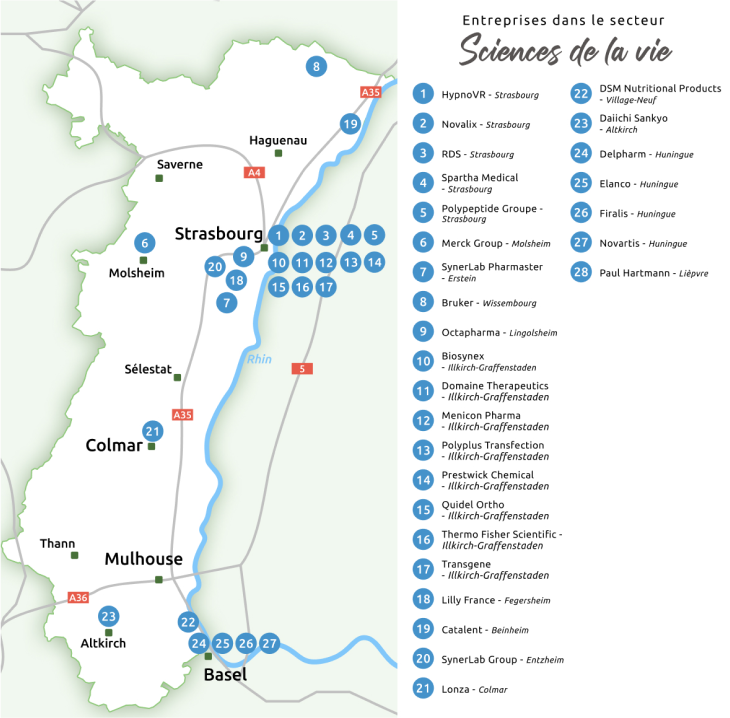
Higher education and research
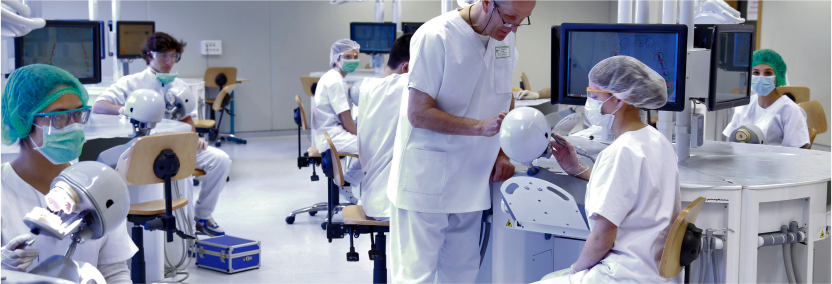
The University of Strasbourg serves as the catalyst for Alsatian excellence in life sciences, providing students with numerous learning opportunities in fields such as cellular and molecular biology, genetics, immunology, neuroscience, and bioimaging.
Among the four Nobel laureates currently active in Alsace is Jules Hoffmann, who received the Nobel Prize in “Physiology or Medicine” in 2011 for his work on genetic immunity. He is a professor at the Institute for Advanced Studies at the University of Strasbourg and an emeritus research director at CNRS.
In collaboration with Nextmed, the university also engages in clinical research, promoting innovation and the discovery of new health solutions. Within the university, cutting-edge institutes provide practitioners with training and skill enhancement. Notably, the Strasbourg Hospital-University Institute is recognized for its excellence in the digestive system and serves as a world reference center for hybrid minimally invasive imaging-guided surgery.
Notable institutions include:
- ESBS – Strasbourg Trinational School of Biotechnology (www.esbs.u-strasbg.fr)
- INSA – National Institute of Applied Sciences in Strasbourg (www.insa-strasbourg.fr)
- Faculty of Life Sciences
- Faculty of Dental Surgery
- Faculty of Pharmacy
- Faculty of Medicine, Midwifery, and Health Sciences
- IGBMC – Institute for Training and Valorization of Research
Eucor – The European Campus
Eucor is a trinational association of five universities in the Upper Rhine region, which borders Germany, France, and Switzerland. Its members include the universities of Basel, Freiburg im Breisgau, Haute-Alsace, Strasbourg, and the Karlsruhe Institute of Technology (KIT). Together, these institutions leverage the expertise of approximately 17,000 researchers, 9,900 doctoral candidates, and 120,000 students in a region renowned for its economic strength and research capabilities, situated in the heart of Europe.
Eucor also promotes the Knowledge Transfer Upper Rhine (KTUR) initiative, which aims to enhance the effectiveness, systematic approach, and sustainability of cross-border knowledge and technology transfer between public research institutions and businesses.
Support programs and financial aid
French research benefits from a variety of support mechanisms, including tax credits, regional and national funding programs, and substantial assistance from the Grand Est region.
- Research tax credit : A financial incentive designed to encourage private investment in research and development activities, allowing companies to reduce their tax liabilities based on their R&D expenditures.
- Grand Est collaborative R&D and innovation projects support: Funding programs aimed at fostering collaboration between businesses and research institutions in the Grand Est region to stimulate innovation and development.
- Nextmed healthtech project funding: Financial support specifically for innovative health technology projects within the Nextmed campus, promoting advancements in patient care and health solutions.
- Force foundation: An organization dedicated to supporting innovation in the life sciences sector through various funding initiatives and resources for companies and researchers.